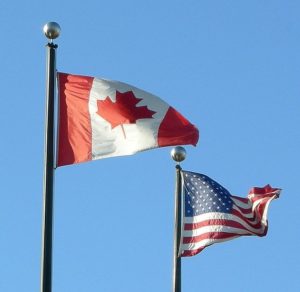Canadian health law experts predict: Canada won’t end up as the drugstore to the U.S.

Source: Wikimedia commons
This editorial by David C. Rosenbaum and Dara Jospé was published in the Financial Post on January 16, 2020. Rosenbaum practices civil litigation and health law at the Canadian law firm Fasken. Jospé is an associate for the same company.
Why Canada won't end up as the drugstore to the U.S.
Opinion: Although in theory the new U.S. import proposals could significantly affect Canadians and their drug supplies, their actual impact likely will be minimal
The Trump administration’s proposal to allow imports of prescription drugs from Canada has met with objections from manufacturers and wholesalers and has also caused alarm among ordinary Canadians regarding potential supply shortages. Concerns are understandable. But in reality the plan likely will have little effect on Canadian drug supplies.
Last July, Washington announced the “Safe Importation Action Plan,” which would permit U.S. states, wholesalers, pharmacists and drug manufacturers to legally import eligible prescription drugs into the U.S. from Canada under specified conditions. In late December, the U.S. Food and Drug Administration (FDA) invited comments on a proposed rule and draft guidance for the plan’s implementation.
Under the proposal, a state that imports drugs would have to partner with a licensed wholesaler in Canada. But press reports suggest leading Canadian wholesalers are not interested in participating. That may seem strange, since wholesalers presumably would benefit from big increases in their export sales. On the other hand, they don’t want to harm their relationships with any drug manufacturers who may also sell to the U.S.
As for drug manufacturers, they are unlikely to permit their Canadian wholesalers or distributors to undercut their prices in the U.S. by exporting drugs that they have supplied specifically for the Canadian market. Indeed, the wholesalers may be contractually prohibited from exporting any product they purchase from manufacturers.
The manufacturers allot sales to a country by assessing the number of people who will take the drug each year based on previous sales volumes plus a reasonable allowance for expected increases. Manufacturers are unlikely either to increase their manufacturing capacity in Canada or to allocate more drugs to this country if they know the drugs will be redirected to another market, especially the much larger and more lucrative U.S. market.
If in spite of these roadblocks Canadian wholesalers did begin to supply even a relatively small number of Americans, there almost certainly would be product shortages in Canada. In a 2017 study, Prof. Marv Shepherd of the University of Texas forecast on the basis of a 2015 baseline that if 20 per cent of U.S. prescriptions were filled from Canadian sources, the Canadian prescription drug supply would be exhausted in just six months. Of course, any manufacturer that allowed such a thing to happen could face both reputational damage and additional regulatory scrutiny from Health Canada.
Drug shortages obviously would cause substantial distress to Canadians. Not being able to access prescribed drugs can compromise a patient’s care. Studies have demonstrated that during drug shortages patients may experience increased stress, higher rates of drug errors, and more adverse events, including even death. Short of such extreme effects, drug shortages can also result in greater costs both to patients directly and to the health-care system as a whole.
The Canadian public would not stand for such a situation, especially since it resulted from policy decisions taken in another country. In response to the new policy, the federal government has already vowed to protect Canadians’ drug supplies and access to medication. We can only speculate as to how it would do so. Supply monitoring of exports coupled with export controls through, for example, permits, may be possible tools, provided these are consistent with Canada’s international trade obligations. So, although in theory the new U.S. import proposals could significantly affect Canadians and their drug supplies, given the likely response both of market players and of Canadian government, their actual impact likely will be minimal.
The FDA has described its proposal as a way to provide “safe, lower cost drugs to consumers.” Importing prescription drugs from Canada is a populist idea that comes up every few years in the U.S. Americans pay the highest prices in the world for their prescription drugs — on average more than three times as much as Canadians for brand name medications, according to the Canadian Patented Medicine Prices Review Board in 2017. Given this, it is hardly surprising that they clamour for lower drug prices. Although there are other obvious steps Washington could take to lower the cost of prescription drugs, so far its politicians have always been reluctant to take them. But importing from Canada can never be a complete or permanent remedy to the problem of high U.S. drug prices. As has often been said, Canada cannot be “drugstore to the world.”